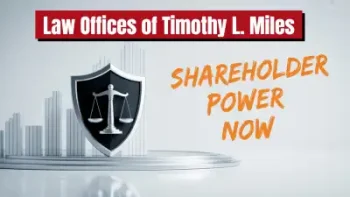
Introduction to the KinderCare Class Action Lawsuit
The KinderCare class action lawsuit seeks to represent purchasers of KinderCare Learning Companies, Inc. (NYSE: KLC) common stock in or traceable to KinderCare’s October 2024 initial public offering (the “IPO”).
Captioned Gollapalli v. KinderCare Learning Companies, Inc., No. 25-cv-01424 (D. Or.), the KinderCare class action lawsuit charges KinderCare and certain of KinderCare’s top executives and directors, KinderCare’s controlling shareholder, and the underwriters of the IPO with violations of the Securities Act of 1933.
If you suffered substantial losses and wish to serve as lead plaintiff of the KinderCare class action lawsuit, or just have general questions about you rights as a shareholder, please contact attorney Timothy L. Miles of the Law Offices of Timothy L. Miles, at no cost, by calling 855/846-6529 or via e-mail at tmiles@timmileslaw.com.
Lead plaintiff motions for the KinderCare class action lawsuit must be filed with the court no later than October 14, 2025.
The KinderCare lawsuit is a securities class action lawsuit that centers on allegations of misleading investors through the provision of inaccurate or incomplete information regarding the company’s financial status and operations. Such allegations, if proven true, could result in significant legal and financial consequences for RxSight. You need to grasp the magnitude of these claims and their potential impact on the company’s future.
Understanding the KinderCare class action lawsuit requires analyzing the details of the allegations. Investors claim that KinderCare’s disclosures were not as transparent as they should have been, leading to financial losses once the truth was revealed. Legal experts are examining whether there was a deliberate attempt to mislead stakeholders, which could lead to punitive measures.
For anyone involved in investing, the KinderCare class action lawsuit serves as a stark reminder of the importance of due diligence and the risks associated with corporate investments. As you navigate through the nuances of this case, consider how transparency and accountability play pivotal roles in maintaining investor trust and confidence in the market.
Allegations in the KinderCare Class Action Lawsuit
KinderCare provides early education and child care services in the United States. In the IPO, KinderCare sold over 27 million shares of common stock to investors at $24 per share, raising $648 million in gross offering proceeds.
The KinderCare class action lawsuit alleges that the registration statement for the IPO was false and/or misleading and/or failed to disclose that:
- Numerous incidents of child abuse, neglect, and harm had occurred at KinderCare facilities;
- KinderCare did not provide the “highest quality care possible” at its facilities, and, indeed, in numerous instances had failed to provide even basic care, meet minimum standards in the child care industry, or comply with the laws and regulations governing the care of children; and
- As a result, KinderCare was exposed to a material, undisclosed risk of lawsuits, adverse regulatory action, negative publicity, reputational damage, and business loss.
Since the IPO, the price of KinderCare stock fell to lows near $9 per share.

The Role of the Lead Plaintiff
In securities class action lawsuits, the lead plaintiff plays a pivotal role in representing the interests of all class members. Under the PSLRA, the lead plaintiff is typically the individual or entity with the largest financial stake in the outcome of the case. This section explores the responsibilities and selection criteria for lead plaintiffs in the context of theKinderCare lawsuit.
Responsibilities of the Lead Plaintiff
The lead plaintiff has several critical duties, including:
- Selecting Counsel: The lead plaintiff is responsible for choosing a law firm to represent the class. This involves evaluating the firm’s experience in securities litigation and ensuring there are no conflicts of interest.
- Monitoring the Case: The lead plaintiff must stay informed about the progress of the lawsuit, including key filings, court dates, and settlement discussions.
- Participating in Settlement Negotiations: The lead plaintiff plays an active role in negotiating settlements, which can significantly impact the recovery for all class members.
Selection Criteria
The PSLRA outlines specific criteria for selecting the lead plaintiff, which include:
- Financial Interest: The court will appoint the plaintiff with the largest financial interest in the relief sought. This is typically assessed based on total losses incurred during the class period.
- Typicality and Adequacy: The lead plaintiff must also meet the typicality and adequacy requirements of Rule 23. This means their claims should align with those of other class members, and they must be capable of adequately representing the class.
The PSLRA and Its Impact on Securities Litigation
The PSLRA was enacted to address concerns about frivolous lawsuits and to streamline the process of selecting lead plaintiffs. This section examines the key provisions of the PSLRA and how they influence the KinderCare class action lawsuit.
Key Provisions of the PSLRA
The PSLRA introduced several important reforms, including:
- Lead Plaintiff Provision: This provision allows investors with the largest financial stakes to take the lead in class action lawsuits, ensuring that those most affected by the alleged misconduct are at the forefront of the litigation.
- Heightened Pleading Standards: The PSLRA requires plaintiffs to provide more detailed allegations in their complaints, which helps to filter out baseless claims.
- Automatic Stay of Discovery: The Act imposes a stay on discovery until motions to dismiss are resolved, preventing premature disclosure of sensitive information

Implications for the Lineage Lawsuit
The PSLRA’s provisions are particularly relevant to the KinderCare class action lawsuit. Investors who suffered significant losses during the IPO period are encouraged to step forward and seek lead plaintiff status. The structured process established by the PSLRA aims to ensure that the most appropriate representatives are chosen to advocate for the interests of the entire class.
The Importance of Institutional Investors
Institutional investors, such as pension funds and mutual funds, often play a crucial role in securities class action lawsuits. Their involvement can enhance the credibility of the case and potentially lead to larger settlements. This section explores the significance of institutional investors in the context of the Lineage lawsuit.
Advantages of Institutional Participation
- Financial Resources: Institutional investors typically have substantial financial resources, allowing them to absorb losses and invest in legal representation.
- Expertise: These investors often have dedicated legal teams and experience in navigating complex litigation, which can be beneficial in managing the case effectively.
- Influence on Settlements: The presence of institutional investors can lead to more favorable settlement terms, as defendants may be more inclined to negotiate with entities that have significant stakes in the outcome.
Challenges Faced by Institutional Investors
Despite their advantages, institutional investors may encounter challenges when seeking lead plaintiff status, including:
- Resource Allocation: Engaging in litigation requires time and resources, which may strain the operations of institutional investors.
- Balancing Interests: Institutional investors must balance their fiduciary duties to beneficiaries with the demands of active participation in litigation.
The Process of Filing for Lead Plaintiff Status
Investors interested in serving as lead plaintiffs in the KinderCare class action lawsuit must follow a structured process. This section outlines the steps involved in filing for lead plaintiff status.
Initial Steps
- Assess Financial Losses: Investors should evaluate their financial losses during the class period to determine if they qualify for lead plaintiff status.
- Gather Documentation: Collect relevant documentation, including purchase records and communications related to the investment in Lineage.

Filing the Motion
- Sworn Certification: Investors must file a sworn certification with the court, detailing their financial interest and commitment to representing the class.
- Notice to Class Members: A notice must be published to inform potential class members about the lawsuit and their right to seek lead plaintiff status.
Deadline for Applications
The deadline for filing a motion to serve as lead plaintiff in the Lineage Class Action Lawsuit is September 30, 2025. Investors must act promptly to ensure their voices are heard in the litigation process.
The Impact of the Lineage Lawsuit on Investors
The outcome of the KinderCare class action lawsuit will have significant implications for investors who participated in the IPO. This section examines the potential consequences of the lawsuit for affected shareholders.
Financial Recovery
If the plaintiffs succeed in their claims, investors may be entitled to recover a portion of their losses. The amount recovered will depend on various factors, including the size of the settlement and the number of class members.
Corporate Accountability
The lawsuit also serves as a mechanism for holding Lineage accountable for its alleged misconduct. A successful outcome may prompt the company to implement changes in its operations and governance practices to prevent similar issues in the future.
Conclusion
The KinderCare class action lawsuit represents a critical juncture for investors who participated in the company’s IPO. Understanding the lead plaintiff selection process under the PSLRA is essential for those seeking to advocate for their rights and recover losses. As the deadline for filing motions approaches, affected investors are encouraged to assess their options and consider stepping forward to serve as lead plaintiffs.
The outcome of this KinderCare lawsuitt could not only impact individual investors but also shape the future of corporate accountability in the securities market. This article provides a comprehensive overview of theKinderCare class action lawsuit and the lead plaintiff selection process, ensuring that readers are well-informed about their rights and options in this significant legal matter.
Frequently Asked Questions About the KinderCare Lawsuit

What initiated the KinderCare class action lawsuit?
The lawsuit was initiated by investors alleging that KinderCare provided misleading information regarding its financial health and operations, resulting in financial losses.
How can I join the KinderCare lawsuit?
If you purchased shares during the class period and suffered a loss, then you are automatically a member of the class and do not need to do anything at this point unless you are considering moving for lead plaintiff.
What are the potential benefits of a KinderCare lawsuit?
Class action lawsuits allow individual investors to collectively seek justice and compensation, which might be challenging to pursue individually. They also promote corporate accountability.
How long will the KinderCare class action lawsuit take to resolve?
The duration of class action lawsuits can vary significantly, depending on the complexity of the case, legal strategies, and whether settlements are reached. It could take several months to years.
Contact Timothy L. Miles Today About a KinderCare Class Action Lawsuit
If you suffered substantial losses and wish to serve as lead plaintiff of the KinderCare Learning Companies, Inc, or just have general questions about you rights as a shareholder, please contact attorney Timothy L. Miles of the Law Offices of Timothy L. Miles, at no cost, by calling 855/846-6529 or via e-mail at tmiles@timmileslaw.com. (24/7/365).
Timothy L. Miles, Esq.
Law Offices of Timothy L. Miles
Tapestry at Brentwood Town Center
300 Centerview Dr. #247
Mailbox #1091
Brentwood,TN 37027
Phone: (855) Tim-MLaw (855-846-6529)
Email: tmiles@timmileslaw.com
Website: www.classactionlawyertn.com
Facebook Linkedin Pinterest youtube






